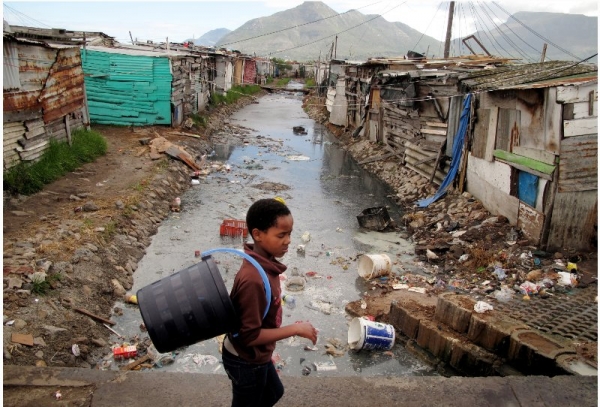

A child walks past a canal in Masiphumelele. Photo by Masixole Feni.
27 May 2015
The government has failed to support the integration of foreigners into the Masiphumelele community, says local leader Mzuvukile Nikelo.
Nikelo, who is now a DA councillor, has lived in Masiphumelele for 20 years. During the outbreak of xenophobic violence in 2008 he was a community leader and at the forefront of successful attempts to integrate foreigners into the community. But, he says, the government failed to provide back up - and the result is overcrowding and lack of resources.
In an interview with GroundUp, Nikelo said: “I am livid that government did not support Masiphumelele integration.”
“As a community leader and councillor, I am part of the government and I am speaking on behalf of it. We have failed my community. And foreigners are not to blame.”
Nikelo said the population of Masiphumelele had swelled following the successful integration of immigrants, but additional land or resources had not been provided.
Overcrowding had led to shortages of toilets and water, health hazards, increased risk of fires and social problems like drug and alcohol abuse, said Nikelo.
“Schools are overcrowded. As a community we do not allow our children to be turned away. The same applies to the clinic.”
If the government was serious about integration, additional land should be provided to the Masiphumelele community, said Nikelo, and government should build more schools and clinics, upgrade sewer pipes and establish a drug rehabilitation centre.
Nikelo said in 2008 Masiphumelele had been divided, with half of the community saying foreigners must go. “Somalis had taken over shops. South Africans could not stand the competition, and there were claims from locals that their jobs and women were being taken by foreigners. Foreigners’ goods were confiscated, they were badly beaten, others injured and hospitalised. Some foreigners walked out and others moved to Southwater temporary camp.”
Nikelo engaged with religious and other community leaders on an integration programme. With help from the police they recovered the confiscated goods and kept them at Masiphumelele Community Hall until the owners could reclaim them. Community leaders visited displaced foreigners in the temporary camp and addressed them as community members. Nikelo told them: “Our people asked us to come and apologise for what has happened and they want you to come back.”
The efforts of the Masiphumelele community have been recognised and consequently Nikelo was one of the invited speakers at a public discussion recently held by the Institute for Justice and Reconciliation that looked at the most recent xenophobic crisis.
Now, he says, the foreigners have been successfully integrated. “What is happening at present in the same community is amazing. “I have seen Somali and other foreign children born of South African women. I also witnessed a Somali teasing his fellow in Xhosa, meaning they are learning from each other.”
But, he said, though government had encouraged communities to integrate foreigners, as Masiphumelele has done, the authorities had not followed through with the additional resources and infrastructure needed to support integration.